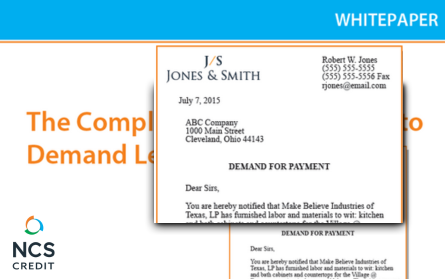
Joint Check Agreements Can Be A Great Risk Mitigation Tool
A Joint Check Agreement is an agreement between multiple parties, allowing one party to make payment through a check issued to two or more payees. Joint Check Agreements are an excellent risk mitigation tool, but they aren't without flaws - check out this infographic for details!

Increase Your Sales! The Competitive Advantage of UCC Filings
A UCC filing can do more than protect your inventory, equipment, and receivables. Properly perfected UCCs can reduce your risk and give you the opportunity to expand your market share, by providing you with the security needed to sell to marginal accounts and increase existing customers’ credit lines.

An Ounce of Prevention: Why Every Credit Professional Should Use UCC Filings
Extending credit is inherently risky, which is why credit professionals take appropriate steps to qualify customers.
Credit professionals should not overlook the immense value of a properly perfected UCC filing. In the event your customer defaults or files for bankruptcy protection, a properly perfected UCC filing elevates your status to that of a secured creditor, putting you in the best possible position to get paid.
Download this whitepaper to learn why you should be filing UCCs, the various types of UCC filings available and how to get your sales team & customers on board!

Demand Letters 101
Demand letters can expedite payment, allow you to maintain control of your collection process and save you money. Download this infographic to see what information you should include in your demand.

Secure Receivables in the U.S. and Canada: UCC vs. PPSA
The U.S.’s Article 9 of the Uniform Commercial Code (UCC) and Canada’s Personal Property Security Act (PPSA) are sets of law that govern commercial transactions between states or provinces. In this infographic, we compare the similarities and differences between the UCC and PPSA.

Learn More about Lien Waivers
In this NCS Extra Credit installment, Jennifer Mach (NCS Customer Relations Specialist) and Jerry Bailey (Executive Sales and Education Services Manager) discuss Lien Waivers.

UCC Filings: Blanket vs. PMSI
There are primarily two types of secured transactions under Article 9 of the Uniform Commercial Code: Blanket Filing and Purchase Money Security Interest (PMSI) Filing. Both filings can protect your receivables, but which is right for your business?
Check out this infographic to learn more about Blanket and PMSI filings

The 9 Documents Every Collector Should Have
Collecting a past due receivable can be difficult, but if your collector has the necessary documentation, debt recovery becomes easier. Providing the documentation at the time the collection is placed facilitates communication with your debtor regarding the past due receivable and it also improves efficiency.
Check out this infographic for the 9 documents you should provide to your collectors.

Understanding Demand Letters and Their Place in the UCC and Mechanic's Lien Processes
Download this whitepaper to learn more, including the demand letter differences for UCCs and mechanic's liens, plus a FREE demand letter sample!

